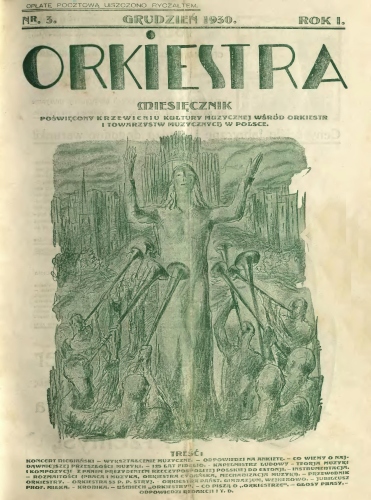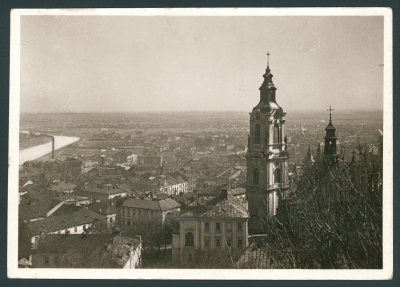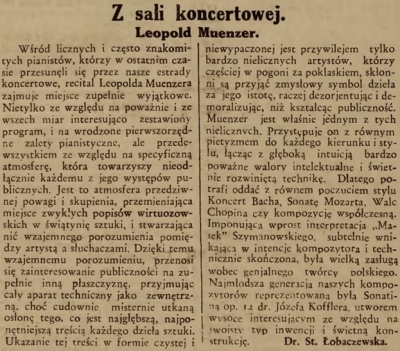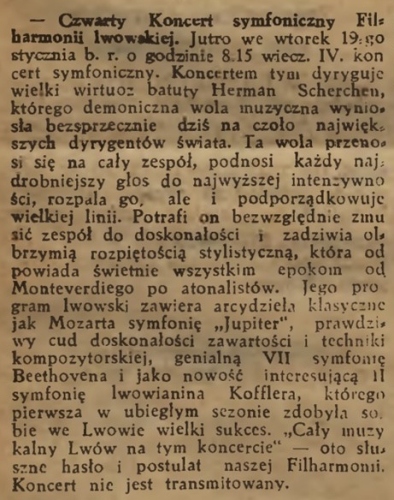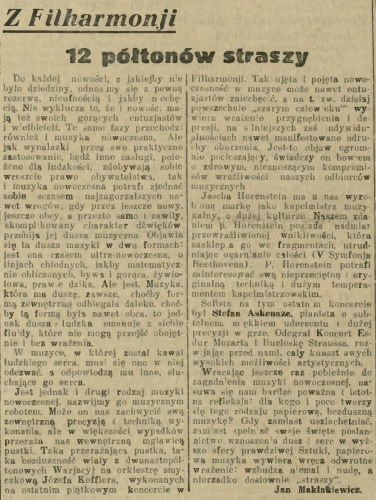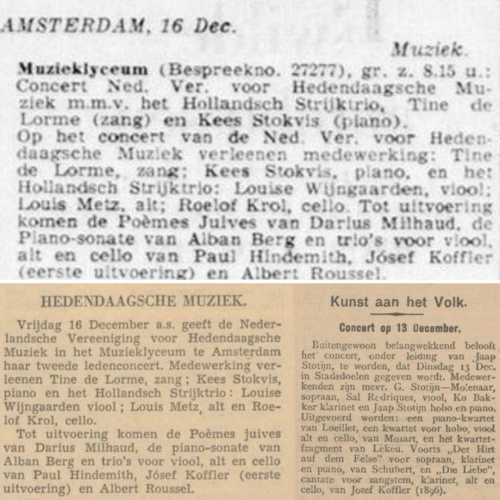
A Composer, Teacher and Journalist in Lwów (1924–1941)
In Lwów, Józef Koffler established fruitful collaborations with a number of Polish music periodicals. In 1926–1929 he published many articles in the Grudziądz-based Muzyk Wojskowy [Military Bandsman]. Sporadically he also wrote for Warsaw’s periodicals Muzyka (1930–1936) and Kwartalnik Muzyczny ([Musical Quarterly], three texts in 1930–1931). Koffler also willingly contributed to local press, writing regular concert reviews and other materials for Lwów’s Ilustrowany Express Wieczorny [Illustrated Evening Express]. Individual texts by Koffler appeared in Warsaw’s prestigious Wiadomości Literackie [Literary News], Antena (radio weekly), and Poznań’s Tęcza (social and cultural journal).
Koffler was the editor in chief and regular contributor to two music periodicals: Orkiestra [The Orchestra] in Przemyśl (1930–1938) and Echo in Lwów (1936–1937). Since Orkiestra’s headquarters were in Przemyśl, Koffler regularly visited that city (located less than a hundred kilometres from Lwów – approximately one-and-a-quarter hours by railway, taking for instance the 6.15 morning train from Lwów). It was about half a kilometre’s walk from Przemyśl railway station to the editorial office at 11 Smolki Street (where Józef Neger’s music instruments store was also located).
Przemyśl had ca 51,000 inhabitants in 1931 (more than 60% Roman Catholics, ca 30% Jews, ca 7% Greek Catholics). From the contents of Orkiestra we can glean that Koffler’s acquaintances in Przemyśl included, apart from the already mentioned shop owner Neger, also Witold Nowak (head of the city’s Music Society), physicians Henryk Biber and Karol Schatzker, army major Rudolf Burda, as well as Roman Marciniec and Franciszek Skoczek.
In 1928–1939, Józef Koffler’s music was performed almost exclusively at Lwów’s concert halls. Though the composer rarely presented it elsewhere in Poland, there were also successful performances abroad.
A number of world premieres of Koffler’s works took place in Lwów’s concert halls, mostly in the Polish Music Society concert hall. There were at least six such first performances in that city before 1939, including two symphonies. 1928 saw the premiere at PTM concert hall of Sielanka [Idyll], Op. 4 for chamber orchestra, 1930 – of Sonatina, Op. 12 for piano. A whole series of pieces was premiered with Leopold Münzer’s participation in 1931, in Polish Radio broadcasts prepared by the Lwów ISCM branch (Trio, Ballet Music, Op. 7, 15 variations d’après une suite de douze tons, Op. 9, and Sonatina, Op. 12). The same variations were first presented in a version for string orchestra (Op. 9a) in 1932, the year when otherwise unidentified ‘folk dances’ (including Hasidic ones) by Koffler were also performed at Lwów’s Nowości Theatre.
Two of his piano pieces (Musique. Quasi una sonata, Op. 8 and Sonatina, Op. 12) were performed by Eduard Steuermann during a 1934 concert of Lwów composers at PTM concert hall. Koffler's Piano works also appeared in Lwów concert programmes in the first half of 1939 (including Variations on a Theme by Johann Strauss Op. 23).
Two major symphonic works were premiered in Lwów: Symphony No. 1, Op. 11 for small orchestra (1936, again at PTM’s venue, broadcast by Polish Radio) and Symphony No. 2, Op. 17 (twice in 1937, at the Grand Theatre). Under the first Soviet occupation (1939–1941) the premieres of Joyful Overture, Op. 25 and Händeliana orchestral variations took place in Lwów (early in 1941).
Koffler was rarely performed in Warsaw. An otherwise unknown Grotesque was presented as a result of a competition at the State Music Conservatoire (1932). The orchestral version of the Variations (Op. 9a) met with a not very favourable audience and critical reception when it was played at Warsaw Philharmonic in the same year and in 1936. In 1927, Polish Radio broadcast a performance of the Fantasia on the Theme of Niewiadomski’s Song under J. Dworakowski. Interestingly, Niewiadomski writes that Koffler’s two piano arrangements of Christmas carols were performed in 1927 in Warsaw ‘with great success by [Lucyna] Robowska at one of the so-called district concerts’ (St. Niewiadomski, ‘Impresje muzyczne ze Lwowa’ [Musical Impressions from Lwów], Warszawianka 22 (1927)).
The list of foreign performances of Koffler’s music is much more impressive. By 1941 his works were presented in Oxford, the Hague, Amsterdam, Vienna, London, Ljubljana, and Kyiv (possibly also in other places though no source information has been found). The premiere of his String Trio, Op. 10 took place at the 9th ISCM Festival in Oxford (1931), of the cantata Die Liebe, Op. 14 – in the Hague (1932). The following year saw an Amsterdam performance of his Variations, Op. 9a, and in 1938 – String Trio.
Selected pieces from his collection of 40 Polish Folksongs were presented in 1935 in Vienna. BBC broadcast his Variations Op. 9a from London in the same year. His Sonatina Op. 12 was played at the Polish embassy in London (at a concert of Polish music in 1936). Interestingly, in the same year Koffler’s orchestral Variations were also broadcast by the ‘most powerful radio station’ in Moscow, as part of a contemporary music concert series. Koffler’s Sonatina Op. 12 and (otherwise unspecified) Piano Variations were performed in 1937 in Ljubljana. The programme of the 16th ISCM Festival in London (1938) included Symphony No. 3 Op. 21. In 1939 BBC broadcast his Suite after J.S. Bach, now considered lost, performed at the same festival. During the first Soviet occupation Koffler's Symphony No. 2 Op. 17 and probably also Symphony No. 4 Op. 26 were both performed in Kyiv.
